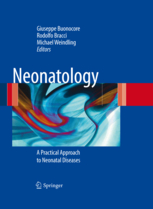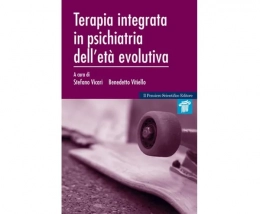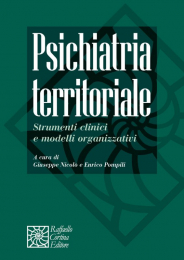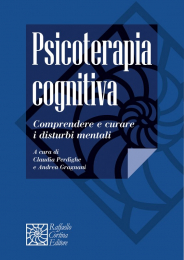Non ci sono recensioni
- - this volume offers both a clear overview and a practical approach to neonatal diseases
- - it will represent an up-to-date educational resource
- - it will provide the most reliable references from trustworthy authors and centers where the reader can find the latest information on these difficult subjects
Neonatology is a science in rapid evolution, and updated information is crucial for the correct and successful care of newborns and fetuses suffering from severe disorders, who until a few decades ago had no chance of survival.
Written in a clear and easy-to-follow way by the most renowned experts in the field, this new textbook wants to offer to neonatologists and pediatricians a modern and complete view of the various problems and aspects of neonatology, currently one of the most complex and advanced fields of pediatrics. The volume contains comprehensive, clear and up-to-date descriptions of the current knowledge of neonatal diseases and of their pathophysiology and treatment, and provides a selection of other relevant information with an evidence-based approach. Figures and diagrams are used to improve understanding of complex problems, and references have been chosen to enable in-depth evaluation of clinical problems. The text pays particular attention to the various diagnostic and/or therapeutic procedures for which reliable guidelines are not yet available. The use of summaries, tables, and accurately selected guidelines or recommendations that will accompany the text will supply quick references and instant solutions to the concerned specialists during their daily practice.
This book aims to provide the scientific community with the state of the art on neonatal care in order to avoid as much as possible, or at least limit, the tragic disabilities due to prematurity, abnormal delivery, and diseases affecting these patients. Expert pediatricians, neonatologists, obstetricians, anaesthesiologists, training doctors in these areas, as well as all child caregivers will find it this volume a fundamental tool for their activity, thanks to the schematic and practical information it offers and to the indications of clinical solutions.
1) EPIDEMIOLOGY Mortality and morbidity 2) GENERAL CHARACTERISTICS OF TERM AND PRETERM FOETUS AND NEWBORN The foetus The newborn 3) THE FOETUS AT RISK Foetal and placental risk factors Genetics of congenital malformations Epigenetic mechanisms Congenital malformations: early diagnosis and prognosis Pre- and postnatal inflammatory mechanisms Chorioamnionitis Diagnosis of foetal distress Multiple pregnancies Intrauterine Growth Retardation Obstetric aspects Neonatal aspects Intervention strategies 4) THE NEWBORN AT RISK FOR SHORT TERM AND LONG TERM MORBIDITY AND MORTALITY Common problems and their prevention Ethical problems Proposal of guidelines for care of extremely low birth infant Decision-making Follow up of high risk newborns Early diagnosis of poor outcome Outcome of high risk newborns and quality of neonatal intensive care CNS plasticity Care of handicapped infants and children 5) ORGANIZATION OF PERINATAL CARE Overview Care of high risk newborns General recommendations and training of doctors and nurses Neonatal transport services The problems of discharge and home care of newborns Risk management Guidelines and protocols Collaborative learning and work The neonatal environment Information and psychosocial intervention in neonatology 6) NEONATOLOGY AND THE LAW 7) "CARE" 8) PAIN IN NEWBORNS Pathophysiology Diagnosis and prevention 9) NEONATAL ANALGESIA AND ANAESTHESIA 10) NEONATAL CARE IN THE DELIVERY ROOM Initial management Approach to low risk newborns Early detection of neonatal depression and asphyxia Resuscitation Oxygen toxicity 11) EXAMINATION OF NEWBORNS Physical examination Primary investigations Second level investigations Early diagnosis of neonatal abnormalities 12) NEONATAL NUTRITION Overview Physiology of the gastrointestinal tract Hormones and gastrointestinal function Nutritional recommendations for healthy newborns, breast milk and promotion of breast feeding Nutritional recommendations for very low birth weight newborns Enteral nutrition of low birth weight newborns Parenteral nutrition Postdischarge nutrition of preterm infants Calcium homeostasis: - Pathophysiology - Calcium and phosphorus requirement Micronutrients and vitamins Safety of medication during pregnancy and breastfeeding 13) INFANTS OF DIABETIC MOTHERS 14) INFANTS OF DRUG ADDICTED MOTHERS 15) INFANTS OF SMOKING MOTHERS 16) NEONATAL PHARMACOLOGY 17) LUNG DISEASES Overview Lung embryology Neonatal pulmonary physiology of term and preterm newborns. Approach to neonatal respiratory diseases Respiratory tract malformations Meconium aspiration syndrome Molecular structure of surfactant: biochemical aspects Surfactant metabolism in neonatal lung diseases Respiratory distress syndrome: predisposing factors, pathophysiology and diagnosis Respiratory disorders in preterm and term infants: pulmonary haemorrhage, transient tachypnea, neonatal pneumonia Air leakage Chronic lung disease Rare lung disease Persistent pulmonary hypertension and diaphragm hernia Treatment of respiratory failure. Non-invasive ventilation Treatment of respiratory failure. Mechanical ventilation Surfactant replacement therapy Nitric oxide therapy in neonatology Extracorporeal membrane oxygenation Problems of steroid treatment of fetus and newborn 18) APNOEA Control of breathing in newborns Apnoea and risk of SIDS 19) NEONATAL CARDIOLOGY Cardiovascular physiology, pathology, clinical investigations Early diagnosis of congenital heart disease. -when and how to treat Arrhythmias and heart muscle diseases Neonatal blood pressure Hyperviscosity syndrome Patent ductus arteriosus 20) NEONATAL JAUNDICE Bilirubin metabolism, unconjugated hyperbilirubinemia, physiological neonatal jaundice. Pathological unconjugated hyperbilirubinemia, isoimmunization, red cells abnormalities, infections Pathological unconjugated hyperbilirubinemia, liver uptake disorders, disorders of conjugation, disorders of enterohepatic circulation Treatment of hyperbilirubinemia 21) LIVER DISEASES Pathology and treatment of liver diseases Conjugated jaundice Surgical treatment of bile tract malformations 22) GASTROINTESTINAL TRACT Oropharyngeal malformations Oesophageal atresia Gastrointestinal malformations and intestinal malrotation Rare surgical emergencies Meconium plug syndrome Hirshsprung disease Gastroenteritis and intractable diarrhea Necrotizing enterocolitis Surgical treatment of necrotizing enterocolitis 23) FOETAL AND NEONATAL HYDROPS 24) HAEMATOLOGY AND IMMUNOLOGY Overview: Coagulation Disorders Pathophysiology of coagulation and deficiencies of coagulation factors and platelets in newborns Risk of thrombosis in the newborns, clinical and laboratory investigations Inflammation and thrombosis Clinical aspects of platelet disorders Red Blood Cell Disorders Foetal and neonatal haemoglobin Neonatal anemia Therapy with haematological growth factors Leucocyte Disorders Physiology and abnormalities of leukocytes Neonatal neutropenia Immunological Aspects Basis of foeto-neonatal immunology Congenital immunodeficiency Inflammatory mediators in neonatal asphyxia 25) NEONATAL MALIGNANCIES 26) FOETAL AND NEONATAL INFECTIOUS DISEASES Overview: Foetal Infections Rubella, HIV, HCV, HBV, Human Parvovirus B19 TBC, Syphilis Toxoplasmosis Neonatal Infections Bacterial and Fungal Infections, sepsis (included prevention of perinatal GBS infection), meningitis, pneumonia, urinary tract infections, osteomyelitis, gastroenteritis, necrotizing enterocolitis, miscellaneous (ophtalmia neonatorum, otitis, skin infections, tetanus) Septic shock Viral Infections: enterovirus, respiratory syncytial virus, etc Vaccination of high risk newborns: laboratory aspects, clinical aspects 27) INBORN ERRORS OF METABOLISM 28) NEONATAL ENDOCRINOLOGY Endocrine diseases of newborns Disorders of thyroid function Disorders of sexual development Rare endocrine diseases 29) KIDNEY AND URINARY TRACT DISEASES Pathophysiology of fetal and neonatal kidneys Acute and chronic renal failure Diagnosis and treatment of renal and urinary tract malformations 30) NEUROLOGY CNS development and causes of brain damage in foetus and newborn Coagulation and inflammation in the development of brain damage Normal and abnormal neurobehavioral development of premature infants Neurological examination of newborns Neonatal EEG Neuroimaging CNS malformations: Genetics aspects Prenatal diagnosis Post-natal diagnosis Pathophysiology and biochemical basis of hypoxic-ischemic syndrome Clinical aspects and treatment of hypoxic-ischemic syndrome Neuroprotective strategies Cerebral hemorrhage Stroke Neonatal seizures Perinatal CNS damage Timing of brain damage Markers of fetal and neonatal brain damage Thrombosis in the development of brain damage Epidemiology of brain damage Neuromuscolar disorders 31) NEONATAL ORTHOPAEDICS 32) DERMATOLOGY 33) OPHTALMOLOGY Malformations Retinopathy of prematurity, epidemiology, athogenesis and basis of prevention Retinopathy of prematurity, ophtalmological aspects of prevention, treatment APPENDIX Protocols




